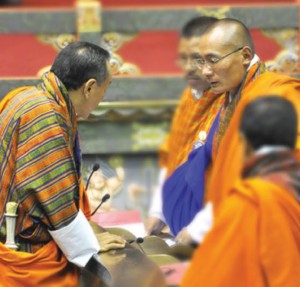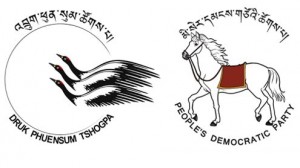Un-culturing democracy in Bhutan

The second test to run for use of adult franchise for Bhutanese populous has opened the door wide open to let the voters know the level of freedom they get in terms of choosing the right persons they choose to rule them. The test is hard for the general people to identify who rules best. The politicians are also finding it tough to convince the large number of individuals opposite to what they had to until five years back – when convincing few individual would open their door for power and politics.
Exchanges of allegations
Reality of open politics and freedom of expression has actually gripped Bhutanese politics these days. As final round of elections near, the parties in the field have already in boil as parties harp on exchange of allegations and accusations.
The allegations are on wide range of topics and from party cadres to the presidents. The cadres and candidates at the constituency level have accused each other of bribing the voters. In fact, Kuensel ran a story on such practices where leaders from both the parties provide cash incentives for votes in village level. In other circumstances, candidates and supporters have been accused of providing meals to the voters after political campaigns as an indirect means of influencing the voters.
In a speech in Sarpang (originally Sarbhang) DPT president Jigmi Thinley warned PDP is putting nation at risk. And in Tsirang (originally Chirang) he accused PDP that the party is compromising on nation’s stability but he did not make it clear, how.
The DPT leadership is angry over loose coalition between DNT and PDP. The party also accused DCT of joining the coalition but this has been balanced after one of the DCT candidates defected to join DPT race from a constituency in Trashigang. DCT, DNT and PDP have come together in many issues to counter against the DPT dominance in politics and PDP is taking every advantage to convert it into win.
More such allegations exchange are likely as D-day nears.
Regionalism and Language
The elections law do not specify which language they should use while in campaign. But election commission indirectly influences that Dzongkha must be used. The use of national language has sprouted many miscommunications in eastern and southern districts.
In Gelephu (formerly Gaylegphug), DPT president Jigmi Thiney made efforts to woo voters in their language – though broken. The country’s political campaign faces linguistic inconvenience: the leaders from eastern and southern districts face challenges in conveying their manifestos to the voters in Dzongkha. The national leadership who have authority to campaign in all constituencies lack these regional language and every efforts to woo voters in their language would twist the very meaning of the intentions and objectives of their manifestos. For last five years the MPs from eastern and southern district remained dump in parliament debates. This is being realised by national leadership at this stage.
Still, the candidates are discouraged from speaking in their language in formal campaigns. Not only by the commission and parties but also by media.
In a public debate televised by BBS from Dagana, a southern Bhutanese lady asked a question in Nepali. The moderator of the show interrupted the heed of Hemant Gurung, a Nepali speaker, to respond the lady in the language she could understand. Ironically, the Dzongkha-speaking moderator translated lady’s question into Dzongkha for Gurung.
In the east, two contestants decided to speak in their own language – Sarchopkha. Ugyen Dorji of DPT and Mingbo Drukpa of PDP in Dewathang (formerly Deothang) delivered their speech in local dialect without interruptions from the moderator. I do see no reasons candidates be restricted from delivering speech in their tongue or in the language local residents understand. If vision, objectives and proposed activities are not well communicated to the voters, there is not meaning why voters should use their right to adult franchise.

The other major debate running hitting around the bush is rise in regionalism. By constitution, parties are restricted from being divided based on region, religion, race or language. The parties in the field are accusing each other of inciting regional disharmony.
The issue surfaced after PDP won most seats in western and south-western districts while DPT swept the east. DPT is alleged wooing easterners against PDP. DPT countered but seeds were already sown and are trespassing the legal boundary.
Election commission also highlighted this critical issue in a letter written to party presidents this week, commission expressed concern the campaign by two parties was becoming ‘increasingly regional in tone and divisive in nature’.
Census issue
The letter also mentioned the parties are wooing the voters in southern districts saying they would look at their ‘census issues’. Many southern Bhutanese who have been alleged to had taken part in 1990 demonstrations or had relatives among Bhutanese refugee population have been denied citizenship, travel and other necessary documents for livelihood. In a few instances, King granted the citizenship ‘kidu’ in Gelephu for which DPT is taking credit.
DPT president Jigmi said his party has done a lot with regard to the ‘census issue’ and assured to look further if his party returns to power this time as well. Though DPT formed a committee to look into the issue, the report of the committee was thrown into the shelves for termites to make home.
The two parties were, the ECB letter stated, raking out “unwarranted” issues connected to national security, national language and citizenship, which are beyond the negotiation for short-term electoral gains and political mileage.
The citizenship issue is directly linked to monarchy and the king. The government has no authority to issue citizenship. And understandingly, the issue was created by direct involvement of the monarchy for which parties would have no liability to debate. Yet, it was astonishing to reveal the fact that one of the prime culprits of 1990 exodus Jigmi Thinley is issuing promises this time around to look into the issue.
Culture
The democratic culture rather started at harsher tone. The nature manifested by the party leaders and workers at this preliminary stage of democratisation would lead to devastating turmoil in the future. The social tensions based on ethnic, religious and political differences are boiling in neighbour. The culture is ready to infect the fledging democracy in Bhutan.
There is need for setting standards of democratic practices and culture alongside protecting rights and promoting freedom of expressions. A leadership engaged in exchange of rivalry for who should be running the government is unlikely to propagate a matured democratic culture to the citizens.